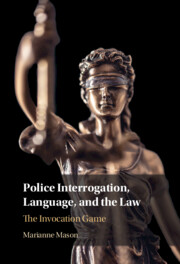Book contents
- Police Interrogation, Language, and the Law
- Police Interrogation, Language, and the Law
- Copyright page
- Contents
- Figures
- Tables
- Acknowledgments
- 1 Introduction
- 2 In the Judges’ Own Words: The Law and Custodial Interrogation in the United States
- 3 Police Interrogation in the United States: From the Reid Technique to the High-Value Detainee Interrogation Group Report
- 4 The Invocation Game: The Prelude to Custodial Interrogation
- 5 Invocations for Counsel, the Rulings, and the Courts: A Statistical Analysis of the Corpus
- 6 Police Interrogation Reform in the United States: Paths to Consider
- Appendix: Jurisdictions and Case Counts
- Glossary
- References
- Index
4 - The Invocation Game: The Prelude to Custodial Interrogation
Published online by Cambridge University Press: 23 December 2023
- Police Interrogation, Language, and the Law
- Police Interrogation, Language, and the Law
- Copyright page
- Contents
- Figures
- Tables
- Acknowledgments
- 1 Introduction
- 2 In the Judges’ Own Words: The Law and Custodial Interrogation in the United States
- 3 Police Interrogation in the United States: From the Reid Technique to the High-Value Detainee Interrogation Group Report
- 4 The Invocation Game: The Prelude to Custodial Interrogation
- 5 Invocations for Counsel, the Rulings, and the Courts: A Statistical Analysis of the Corpus
- 6 Police Interrogation Reform in the United States: Paths to Consider
- Appendix: Jurisdictions and Case Counts
- Glossary
- References
- Index
Summary
Chapter 4 provides the theoretical framework for suspects’ invocations for counsel in the book’s corpus. The analysis will focus on the discursive features of suspects’ invocations for counsel during custodial interrogation, as well as the sequences of talk that follow the suspects’ invocations. This part of the analysis will use applied game theory, specifically hypergame theory, to describe police-suspect exchanges after a suspect invokes counsel. The model of the invocation game of police interrogation extends signal analysis from simple signaling games into extended conversations based on strategic objectives. This application of game theory to the invocation stage of an interrogation shows how an interrogator can manipulate a custodial suspect to change their preference to invoke counsel due to the ambiguities created by case law, which designates interrogators as arbiters of what constitutes an unequivocal invocation of the right to counsel, and stylized by formal training that encourages interrogators to engage in strategic discourse with suspects to maintain the possibility of obtaining statements.
Keywords
- Type
- Chapter
- Information
- Police Interrogation, Language, and the LawThe Invocation Game, pp. 92 - 115Publisher: Cambridge University PressPrint publication year: 2023

